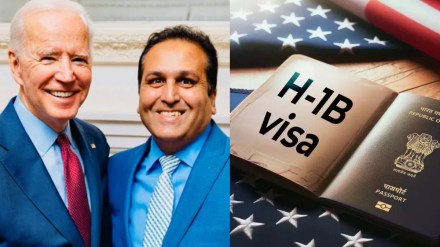Democrat Ajay Jain Bhutoria opened up about the divide within the Indian American community regarding the ongoing H-1B visa reforms.
In the recent episode of the Area 51 podcast, Bhutoria stated that while the visa program was designed to bring highly skilled workers into the US, it is now creating challenges for both Indian-American and American-born graduates, particularly in the tech industry.
I have seen a lot of articles of late calling out the silence of the Indian American community against the H-1B filing fee. Ajay Bhutoria (@ajainb) broke down the growing resentment of the Indian American community against the H-1B community.
— Rahul Menon (@TheRahulMenon) October 7, 2025
In Area 51's latest episode, we… pic.twitter.com/v7H0iGGQsp
‘There’s this feeling that opportunities aren’t equal’
“The quality of H-1B workers can be found locally now,” Bhutoria stated. He also spoke about the growing frustration among second-generation Indian Americans, particularly those born and educated in the US. While many are hard-working and diligent, he noted that some are facing a tough job market.
“Kids who are born here, who go to college here and do the right things, are finding it tough to get the right jobs,” Bhutoria explained. “Not every kid, but a lot of them are working hard, yet they are still having a difficult time, especially in tech.”
He continued, “There is this feeling that opportunities aren’t equal, if you go to Michigan or ohio, when they see a guy from a village in India who just has an engineering degree, and my son also has the same degree. But he is able to come here and make 70 to 80000, that feeling is not right.”
What is the $100K H-1B visa fee?
On September 19, 2025, President Donald Trump signed a proclamation raising the annual fee for H-1B work visas to $100,000.
White House staff secretary Will Scharf called the H-1B program “one of the most abused” in the current immigration system. He said the new fee is meant to protect US jobs and prioritise the domestic workforce.
The goal, according to the administration, is to ensure the visa program is used only for bringing in truly high-skilled workers and not for replacing American employees
Are Indian Americans silent over the H-1B revamp?
In recent years, the label “Indian-American” has often been seen as a bridge between two identities, representing India in the US while following American values and culture.
However, there has been a noticeable shift in how this community views its role, especially when it comes to issues like immigration policy.
Recently, Shashi Tharoor criticised the silence of Indian Americans in the face of the US government’s proposed $100,000 fee for H-1B visa applications.
Tharoor argued that Indian Americans, with their access to power and influence, should be more vocal in challenging policies that negatively impact their community.
In response, Suhag A. Shukla, executive director of the Hindu American Foundation, responded that while individuals of Indian descent can be proud of their heritage, their primary responsibility lies in advocating for their rights and interests as American citizens.
“Just as India’s citizens prioritise their country’s national interests, American citizens, including Indian Americans, have a duty to pursue their own,” Shukla said, drawing a clear line between supporting Indian values and focusing on American priorities.
Indian Americans are increasingly seeing themselves not as representatives of India, but as active participants in shaping American policy.
At the same time, many Indian-origin professionals, whether US citizens or green card holders are struggling with unemployment. Given this, many might prioritise opportunities for those already in the US before advocating for the influx of new visa holders.
